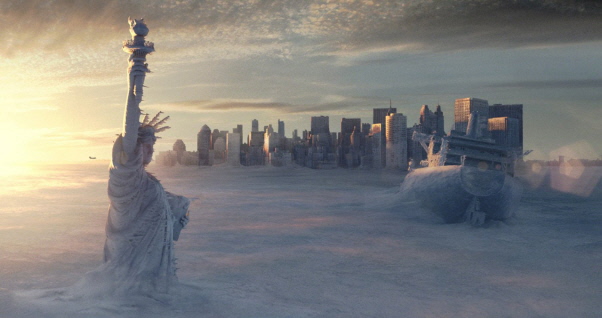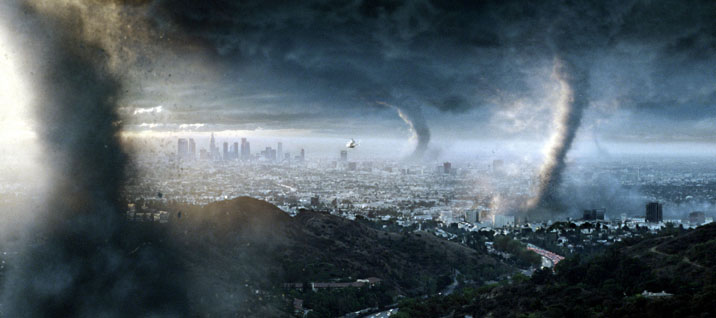The Day After Tomorrow (2004)
CAST: Dennis Quaid, Jake Gyllenhaal, Emmy Rossum, Ian Holm, Sela Ward, Dash Mihok, Jay O. Sanders, Kenneth Welsh, Austin Nichols, Tamlyn Tomita, Glenn Plummer, Nestor Serrano
REVIEW:
By now, anyone walking into the theater to see a movie whose opening credits include “a film by Roland Emmerich” should know what to expect. From Independence Day to the deservedly much-maligned 1998 Godzilla reboot, to his later disaster movie 2012, Emmerich reliably serves up a cocktail of similar ingredients: a sprawling ensemble of one-dimensional characters scurrying around in the wake of some cataclysm, including corny dialogue, earnestly overdramatic speechifying, a bunch of splashy special effects, the gleeful annihilation of famous landmarks (especially ones located in New York City), and a tidal wave of cliches as towering as any onscreen. Within that narrow variance of mediocre and slightly above or below, The Day After Tomorrow falls somewhere in the marginally above average range; it’s more watchable than Godzilla but not as cheesily entertaining as Independence Day (probably Emmerich’s biggest “epic”). It’s wildly over-the-top global disaster scenario bears more than a passing resemblance to the even more wildly over-the-top 2012. Unfortunately, a slightly above average Roland Emmerich movie is still mediocre by general film standards. Nonetheless, those who watch what Emmerich churns out should know what they’re getting, and if all you demand is some big-budget effects of mass destruction and some “check your brain at the door” disaster movie sequences, The Day After Tomorrow should prove serviceable entertainment.
In a way, The Day After Tomorrow is like a souped-up version of old-fashioned disaster epics. There is the large cast of characters, led here by climatologist Jack Hall (Dennis Quaid), who in collaboration with British scientist Terry Rapson (Ian Holm), has come to the conclusion that global warming has brought the Earth to the brink of a new Ice Age, a discovery he predictably shares loudly, and which the token authority figure, in this case the Vice President (Kenneth Welsh), predictably ignores. Meanwhile, Jack’s son Sam (Jake Gyllenhaal) is attending a scholastic decathlon competition in New York City, mostly to get close to his would-be girlfriend (Emmy Rossum). When weather goes haywire all over the globe (including tornadoes ripping apart Los Angeles and Britain engulfed in an arctic blizzard), Sam and friends get trapped with a crowd of refugees when New York is flooded and later freezes solid. Jack sets out to walk from Philadelphia to Manhattan on an almost singlehanded rescue mission in polar conditions and bad odds.
The Day After Tomorrow serves up a smorgasbord of cliches from beginning to end. Capable performers like Dennis Quaid, Jake Gyllenhaal, and Ian Holm are relegated to earnestly acting out one-dimensional disaster movie archetypes. There is the broken family (Quaid, Gyllenhaal, and mom Sela Ward) who reconnect through a disaster situation. Quaid spends the first chunk of the movie being “The Expert No One Listens To”, and then becomes “The Dad Who Won’t Abandon His Son” (leaving poor Ian Holm as the sort of bonus Expert No One Listens To #2, and thus more disposable). Kenneth Welsh is the “Authority Figure Who Doesn’t Listen Until It’s Too Late” (is it coincidence the movie gives us an unsympathetic VP who vaguely resembles Dick Cheney?). Sela Ward’s doctor, in addition to being “Estranged Wife Who Reconnects With Husband” and “Worried Mother”, multi-tasks with an underdeveloped subplot about another reliable Disaster Movie accessory, a sick child, whom she refuses to abandon (the obligatory dog is also onhand). There are generic sidekicks (Dash Mihok and Jay O. Sanders), a vaguely “comic relief” homeless man (Glenn Plummer), and the “Hero’s Boss Who Doesn’t Listen To Him” (Nestor Serrano). Like the fireball in the traffic tunnel in Independence Day, we get shots of random disaster fodder extras gawking in horror at a tidal wave approaching in their rearview mirror (and showing ridiculously slow reaction times). And, of course, in the end, millions might die, and civilization might be devastated, but everything’s okay because Jake Gyllenhaal gets to make out with Emmy Rossum and the intrepid Hall clan is reunited.
 Lest my review be too derisive, The Day After Tomorrow has sequences where it’s entertaining in a silly kind of way. As disaster movie premises go, this one (radical climate change brought about by global warming) is at least more plausible than the incoherent nonsense in 2012, albeit shown to progress wildly quickly and abruptly for purposes of cinematic excitement. With tornadoes gang-banging Los Angeles, Jack Frost paying Britain a visit, and New York City getting hit with the biggest tidal wave since Deep Impact, it’s like Mother Nature springs a carefully coordinated ambush (of course, with precision strikes on famous landmarks, like a tornado wiping out the Hollywood Sign). I’m as susceptible to the visceral thrill of epic movie destruction as the next person, and the tornado and flood sequences in particular are great fun. Unfortunately, the moments where The Day After Tomorrow gets the adrenaline pumping are too few. Like Godzilla and Independence Day, the pace is uneven and there are too many characters running around wasting screentime on subplots we don’t care about. Who really cares about the kid with cancer, or Jack’s ill-fated sidekick, or the British scientist with a wife and baby, when their subplots are this perfunctory, obligatory, and undeveloped? I don’t just care about something because a movie tells me I should; the movie has to earn it, and The Day After Tomorrow falls flat with all the “small tragedies” it tries to throw at us, about characters we never get to know, and don’t care about. Actually, even our leads, Jack and Sam, are hardly three-dimensional. Dennis Quaid plays stalwart determination because it’s basically the only character trait the script gives him, while Jake Gyllenhaal is earnest and likable, but likewise, that’s about all he gets a chance to be. A decathlon rival (Austin Nichols) is barely established as a budding romantic rival before he’s all BFF with Sam and encouraging him to confess his feelings. When did this character transformation happen? Who knows, but it must have been a quick one. Such is the power of disaster movies. A moderately exciting cat-and-mouse game with Sam and friends facing off against a pack of wolves on a beached ship is marred somewhat by obviously CGI wolves. Animating something that actually exists in reality, like wolves, always feels lazy to me. Of the “main” plotlines (the myriad pointless subplots wandering around are barely worth mentioning), Sam’s is the most engaging, while Jack’s traipsing around is less-than-riveting and contributes to the general bloated meandering of the pace (something virtually every Emmerich movie is guilty of).
Lest my review be too derisive, The Day After Tomorrow has sequences where it’s entertaining in a silly kind of way. As disaster movie premises go, this one (radical climate change brought about by global warming) is at least more plausible than the incoherent nonsense in 2012, albeit shown to progress wildly quickly and abruptly for purposes of cinematic excitement. With tornadoes gang-banging Los Angeles, Jack Frost paying Britain a visit, and New York City getting hit with the biggest tidal wave since Deep Impact, it’s like Mother Nature springs a carefully coordinated ambush (of course, with precision strikes on famous landmarks, like a tornado wiping out the Hollywood Sign). I’m as susceptible to the visceral thrill of epic movie destruction as the next person, and the tornado and flood sequences in particular are great fun. Unfortunately, the moments where The Day After Tomorrow gets the adrenaline pumping are too few. Like Godzilla and Independence Day, the pace is uneven and there are too many characters running around wasting screentime on subplots we don’t care about. Who really cares about the kid with cancer, or Jack’s ill-fated sidekick, or the British scientist with a wife and baby, when their subplots are this perfunctory, obligatory, and undeveloped? I don’t just care about something because a movie tells me I should; the movie has to earn it, and The Day After Tomorrow falls flat with all the “small tragedies” it tries to throw at us, about characters we never get to know, and don’t care about. Actually, even our leads, Jack and Sam, are hardly three-dimensional. Dennis Quaid plays stalwart determination because it’s basically the only character trait the script gives him, while Jake Gyllenhaal is earnest and likable, but likewise, that’s about all he gets a chance to be. A decathlon rival (Austin Nichols) is barely established as a budding romantic rival before he’s all BFF with Sam and encouraging him to confess his feelings. When did this character transformation happen? Who knows, but it must have been a quick one. Such is the power of disaster movies. A moderately exciting cat-and-mouse game with Sam and friends facing off against a pack of wolves on a beached ship is marred somewhat by obviously CGI wolves. Animating something that actually exists in reality, like wolves, always feels lazy to me. Of the “main” plotlines (the myriad pointless subplots wandering around are barely worth mentioning), Sam’s is the most engaging, while Jack’s traipsing around is less-than-riveting and contributes to the general bloated meandering of the pace (something virtually every Emmerich movie is guilty of).
There are a few striking moments. The special effects are nice, but that pretty much goes without saying. One senses Jake Gyllenhaal and Ian Holm could have done substantially more with their characters had they been given the chance. There is one genuinely amusing moment of political commentary, with the disaster in the northern hemisphere now driving hordes of American illegal immigrants across the border into Mexico. There is a striking shot of the Statue of Liberty looking like a modern ice sculpture, and surreal images of ships floating through the flooded streets of Manhattan. But a few cheap thrills and “ooh and ahh” moments of big special effects and stuff blowing up real good does not add up to a memorable viewing experience, and overall The Day After Tomorrow is more of the same from Roland Emmerich….big on special effects and disaster porn, but mighty scarce when it comes to anything resembling depth, or a sign that the entire production team had one original, non-cliched thought in their collective heads.
* *
